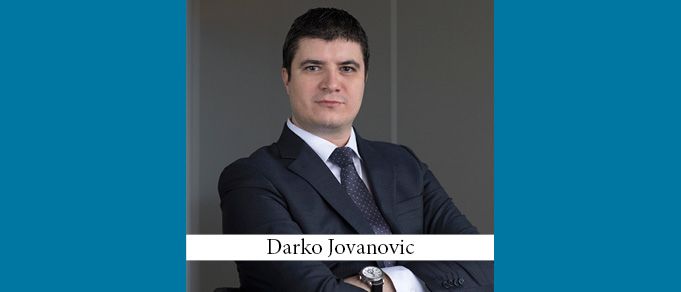Karanovic & Nikolic Partner Darko Jovanovic is upbeat. "Serbia is once again a hotspot in the region,” he says, “this time not for unpleasant reasons, but for its economic recovery.”
According to Jovanovic, “the previous and current government made significant moves forward in terms of financial consolidation — tightening and cuts to loose ends of the public deficit — to increase the attractiveness of the country to FDI.” Jovanovic refers, among other things, to an investment incentives scheme adopted by the Republic of Serbia, and says that, “as a result of the concerted efforts of the government, the IMF is projecting that the country’s deficit will shrink to 1.1 % of GDP."
Jovanovic also refers positively to a recent Western Balkan Summit in Trieste, where "it was decided to create a Regional Economic Area, consolidating markets of some 20 million people — Serbia, Macedonia, Montenegro, Albania, Bosnia, and Kosovo. A transport community treaty was also signed, which should make transport more efficient and facilitate the transfer of goods. Also good is that there is a higher commitment by European banks that attended the meeting, and they committed to investing 3.5 billion euros in that Regional Economic Area, out of which 50% will be committed to Serbia exclusively.”
Jovanovic reports "high activity on the infrastructure side, predominantly on the basis of highway construction projects with Chinese construction firms.” He says, “there will be a new railway built between Belgrade and Budapest, in large as the result of the good cooperation between two countries, plus Hungary’s overall commitment to Serbian investments, which also includes the recent acquisition by Hungary’s OTP bank of the Serbian NGB subsidiary.” According to Jovanovic, “this railway will fit within that context.”
Similarly, he says, "we were delighted to come to the end of the first/epic PPP project in Serbia — a waste treatment project in Vinca, Belgrade — which is now in the final phase of awarding the project on the basis of Serbia’s PPP/Procurement legislation.” In addition, he reports, “a new and even bigger concession has been announced for the Belgrade airport expansion.” The project has created “huge interest” in foreign investors, Jovanovic says, including Vinci, from France, Inchon Airport from Seoul, GMR (which operates New Delhi airport), and HNA, from China, which Karanovic & Nikolic is advising on the process. “The decision should be made in the next two months, he says, and the process is expected to result not only in a good concession fee to the government but also in improvements and expansions to the current airport.
“And we’re expecting to see several large privatizations as well,” he says, "including several agriculture companies and the Bor mining and smelting complex.” According to Jovanovic, "if the government manages to sell it — probably to either Chinese or Russian investors — we would see further financial consolidation, as currently it’s losing money, so it would need to be improved first before it becomes profitable."
"Real Estate is booming,” Jovanovic says, "primarily because of Israeli investments, but also because of South African REITs that have come and bought two largest shopping malls in Belgrade.” He says new residential complexes and new office parks are popping up regularly, and he describes a notable development on the Belgrade waterfront. "At the end of the day,” he says, “there are a number of very good things happening in Serbian real estate, influenced to some extent by the relaxation of certain procedures for issuing construction permits.”
The banking sector in Serbia is consolidating, Jovanovic reports, with several banks exiting the market and others expected to follow in the next few months. “But the sector is not shrinking,” he says, "because their assets are being taken over by existing banks (such as OTP and Societe Generale) or by new banking players (such as Direktna Bank and RiverStyxxInvestments). He says the first wave of NPL transactions is more or less over in Serbia, “but we’re now starting to see more secondary sales of those portfolios.”
Finally, Jovanovic reports that there are ongoing discussions about amending the Serbian Constitution, “If these amendments happen, other legislative shaping may be expected as well.”
Notwithstanding possible amendments to the Constitution, Jovanovic says changes to the country’s Company Law are being considered, as are changes to the PPP/Concession Law, which will l be changed to fix some of the practical problems that arose in recent projects. “We also expect to see changes in the Law on Capital Markets, which are still relatively weak in Serbia,” he says, as well as "changes to the foreign exchange regulations, as well as to the Public Procurement law, which also needs to be reshaped.” According to Jovanovic, “at the end of the day all these changes should have the same goal: To improve the market to attract domestic and foreign investors.”
Ultimately, Jovanovic says that he’s optimistic about the state of things in Serbia, though he cautions that political and other developments across CEE may affect the country's progress. "As always, lots of things in the region are moving into right direction,” he says, “and currently forecasts look very good.”


